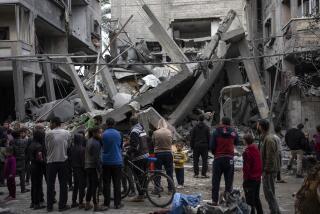U.S. Eases Its Stance on Sudan Resolution
UNITED NATIONS — The United States on Thursday dropped its insistence on explicitly threatening sanctions against Sudan over atrocities in its Darfur region, paving the way for the Security Council to adopt a resolution today.
Washington overcame opposition to its draft resolution by changing language that eight of the council’s 15 members found objectionable. The fourth revision drops the term “sanctions,” although it maintains an implicit threat of diplomatic and economic penalties if Sudan fails to disarm militias in Darfur within 30 days.
U.S. Ambassador John Danforth said he cared more about “starting the clock ticking” to spur Sudan to take action in the western region, where 30,000 civilians have died, than about the language used to do so.
Danforth, a former special envoy to Sudan, said the council’s intention to impose sanctions was clear if the government did not live up to its promises to disarm militias and protect its citizens.
“The wording in the initial draft of the resolution included ‘sanctions.’ It turns out that the use of that word is objectionable to certain members,” he said. “They would rather use what I would call ‘U.N. speak’ for exactly the same thing.”
The draft resolution calls on Sudan to disarm largely Arab militias known as janjaweed, and imposes an arms embargo to cut off the flow of weapons to both the militias and rebel groups in the region. It requires U.N. Secretary-General Kofi Annan to report every 30 days on Sudan’s progress and provides for “further actions” under Article 41 of the U.N. Charter -- implying sanctions -- if there is insufficient action.
The conflict began in February 2003 when two rebel groups took up arms for a greater share of the country’s oil wealth. They say the government in Khartoum is using the militias to drive black Africans from their land and turn it over to Arab tribes loyal to Khartoum.
The government denies its controls the janjaweed, calling the attacks “tribal conflict.” But the U.N., U.S. and human rights groups charge that Khartoum has fostered the janjaweed’s brutal and systematic campaign of the last 18 months -- causing what the U.N. says is “the world’s worst humanitarian crisis.”
More than 1 million people have been displaced, and 2.2 million are in urgent need of aid, according to U.N. reports.
“No government can be responsible for or complicit in the explicit killing and brutalizing and raping of civilians,” Danforth said. “They created this monster; it’s their responsibility to control it.”
The Sudanese government signed a communique July 3 promising to halt the violence, disarm the militias and aid the secure return of people displaced from their homes. But nearly a month later, despite Sudan’s claims of action, U.N. monitors and aid groups say the situation is worsening.
In a report released Wednesday, African Union cease-fire observers said suspected militia elements chained villagers and burned them alive this month in a town called Suleia.
Annan said Thursday that he was “gravely concerned” about reports of continuing intimidation and attacks, including rape, against displaced people in camps in Darfur.
Eight council members -- Russia, China, Pakistan, Algeria, Angola, Benin, Brazil and the Philippines -- had objected to spelling out the threat of sanctions.
“Explicitly brandishing sanctions gives the impression that the council is presuming that the government of Sudan is not going to comply, and that could be counterproductive,” Algerian Ambassador Abdallah Baali said. “We would rather show that we have faith that it will cooperate.”
The wording change appeared to satisfy all but Russia, China and Pakistan, but the three countries are not expected to oppose the resolution.
Secretary of State Colin L. Powell, during a visit to Kuwait, acknowledged that Egypt and other Arab nations think that Khartoum should be given more time and that too much pressure could destabilize the government.
“At the same time, everybody recognizes that pressure is needed or else we wouldn’t get any action at all,” Powell said.
Princeton N. Lyman, head of the Africa program at the Council on Foreign Relations, said that dropping the word “sanctions” would greatly weaken the resolution.
Times staff writer Paul Richter in Washington contributed to this report.
More to Read
Sign up for Essential California
The most important California stories and recommendations in your inbox every morning.
You may occasionally receive promotional content from the Los Angeles Times.










